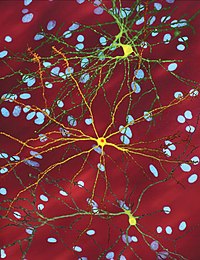
Photo from wikipedia
The Canadian Institutes for Health Research (CIHR) launched the “International Collaborative Research Strategy for Alzheimer's Disease” as a signature initiative, focusing on Alzheimer's Disease (AD) and related neurodegenerative disorders (NDDs).… Click to show full abstract
The Canadian Institutes for Health Research (CIHR) launched the “International Collaborative Research Strategy for Alzheimer's Disease” as a signature initiative, focusing on Alzheimer's Disease (AD) and related neurodegenerative disorders (NDDs). The Canadian Consortium for Neurodegeneration and Aging (CCNA) was subsequently established to coordinate and strengthen Canadian research on AD and NDDs. To facilitate this research, CCNA uses LORIS, a modular data management system that integrates acquisition, storage, curation, and dissemination across multiple modalities. Through an unprecedented national collaboration studying various groups of dementia-related diagnoses, CCNA aims to investigate and develop proactive treatment strategies to improve disease prognosis and quality of life of those affected. However, this constitutes a unique technical undertaking, as heterogeneous data collected from sites across Canada must be uniformly organized, stored, and processed in a consistent manner. Currently clinical, neuropsychological, imaging, genomic, and biospecimen data for 509 CCNA subjects have been uploaded to LORIS. In addition, data validation is handled through a number of quality control (QC) measures such as double data entry (DDE), conflict flagging and resolution, imaging protocol checks1, and visual imaging quality validation. Site coordinators are also notified of incidental findings found in MRI reads or biosample analyses. Data is then disseminated to CCNA researchers via a web-based Data-Querying Tool (DQT). This paper will detail the wide array of capabilities handled by LORIS for CCNA, aiming to provide the necessary neuroinformatic infrastructure for this nation-wide investigation of healthy and diseased aging.
Journal Title: Frontiers in Neuroinformatics
Year Published: 2018
Link to full text (if available)
Share on Social Media: Sign Up to like & get
recommendations!